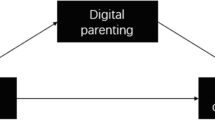
Overview
- Describes the cognitive, physical, and psychosocial impacts of digital technology on infants, children, and adolescents
- Explores how media influences individuals as well as relationships, family, culture, and society
- Examines the impacts of specific digital domains pertinent to youth (e.g., education technology, video gaming)
- This book is open access, which means that you have free and unlimited access
Buy print copy
Tax calculation will be finalised at checkout
About this book
This open access handbook synthesizes the current research about the impacts of digital media on children across development. Drawing on the expertise of scientists and researchers as well as clinicians and practitioners, the book summarizes research through interdisciplinary expert reviews. First, it addresses the cognitive, physical, mental, and psychosocial impacts on infants, children, and adolescents. Next, the book explores how media influences relationships, family, culture, and society. Finally, it examines the impacts of specific digital domains pertinent to youth, including education technology, video gaming, and emerging technologies. Chapters employ a parallel structure, including background on the topic, summary of the current state of the research, future research directions, and recommendations for relevant stakeholders. The volume examines the timely issue of optimal child development in an increasingly digital age, offering innovative approaches to establish a solid and robust scientific foundation for this field of study as well as evidence-based action for adults who support positive youth development.
Key areas of coverage include:
• Cognition and brain development.
• Physical and mental health.
• Problematic uses of the internet.
• Race.
• Gender and sexuality.
• Parenting in the digital age.
• Cyberbullying and digital cruelty.
• Media policy.
The Handbook of Children and Screens is a must-have resource for researchers, professors, and graduate students as well as clinicians, therapists, educators, and related professionals in clinical child, school, and developmental psychology, social work, public health, epidemiology, neuroscience, human development and family studies, social psychology, sociology, and communication.
This is an open access book.
Similar content being viewed by others
Keywords
- Body image, disordered eating, digital media, adolescents
- Digital media, cognition, brain development, infancy, childhood
- Cyberbullying, digital cruelty, children, adolescents
- Diversity, marginalized youth, online identity
- Education technology, data privacy, surveillance, datafication
- Empathy, kindness, dignity, digital media
- Family, parenting, culture, society, media influences
- Gaming disorder, screen use, children, adolescents
- Gender, sexuality, adolescence, digital media
- Language development, digital media use, early childhood
- Neural development, screen media, learning, children
- Obesity, nutrition, digital media, children, teens
- Race, racism, youth, digital media
- Relationships, identity, social media, childhood, adolescence
- Screen media, children, imagination, creativity, play
- Sleep health, screen use, childhood, adolescence
- Open Access
Table of contents (88 chapters)
-
Front Matter
-
Research Concerning Cognitive, Physical, Mental, and Psychosocial Impacts on Children
-
Front Matter
-
Editors and Affiliations
About the editors
Dimitri A. Christakis, MD, MPH., is the George Adkins Professor of Pediatrics at the University of Washington, the Chief Health Officer at Special Olympics International, Editor in Chief of JAMA Pediatrics, and Chief Science Officer at Children and Screens: Institute of Digital Media and Child Development. He has devoted his career to investigating how early experiences impact children and to helping parents improve their children’s early learning environments. He and his colleagues in the Christakis Lab have made a number of landmark findings, including discovering that young children who watch TV are more likely to develop attention problems and other health and behavioral issues. He is the author of more than 250 original research articles, a textbook on pediatrics, and co-author of the book, The Elephant in the Living Room: Make Television Work for Your Kids. He has appeared on CNN, NPR, Today, CBS News, ABC News, and NBC News and was recently featured as a TEDx speaker.
Lauren Hale, Ph.D., Professor of Family, Population, and Preventive Medicine; Core Faculty, Program in Public Health; Renaissance School of Medicine, Stony Brook University, studies the social patterning of sleep health and how it contributes to inequalities in health and well-being with current or previous funding from NICHD, NIDDK, NHLBI, and NIA in addition to private funding. Dr. Hale has more than 160 publications in peer-reviewed journal articles. She serves on the Board of Directors (recently as Chair) of the National Sleep Foundation and is the founding Editor-in-Chief of the journal Sleep Health as well as the Scientific Advisory Panel of the Pajama Program and Children and Screens: Institute of Digital Media and Child Development.
Bibliographic Information
Book Title: Handbook of Children and Screens
Book Subtitle: Digital Media, Development, and Well-Being from Birth Through Adolescence
Editors: Dimitri A. Christakis, Lauren Hale
DOI: https://doi.org/10.1007/978-3-031-69362-5
Publisher: Springer Cham
eBook Packages: Behavioral Science and Psychology, Behavioral Science and Psychology (R0)
Copyright Information: The Editor(s) (if applicable) and The Author(s) 2025
Hardcover ISBN: 978-3-031-69361-8Published: 13 February 2025
Softcover ISBN: 978-3-031-69364-9Due: 27 February 2026
eBook ISBN: 978-3-031-69362-5Published: 05 December 2024
Edition Number: 1
Number of Pages: XLI, 657
Number of Illustrations: 4 b/w illustrations, 4 illustrations in colour
Topics: Developmental Psychology, Pediatrics, Child and School Psychology, Children, Youth and Family Policy, Clinical Psychology, Public Health



